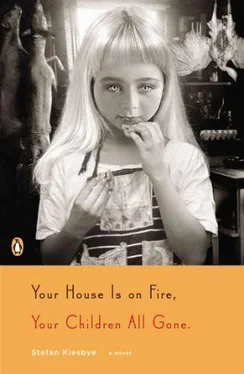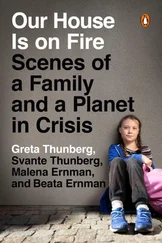We were hollering and yelling at Käthe when Rosemarie Penck, the apothecary’s wife, came running from her store. She made her way through the crowd to better see what was going on, or so we thought. But it wasn’t Käthe she was after. Instead she went up to Heidrun Brodersen in her green dress, took aim, and beat the woman with her purse.
Käthe’s screams didn’t abate, but nobody except for my dad, whose hand was bleeding profusely, took notice. Mrs. Penck was a small, wiry woman, and we laughed at her efforts. It looked too strange, small Mrs. Penck beating a woman two or three times her size.
Mrs. Penck wore her white coat and gold-rimmed glasses, her already high voice climbed several octaves. “Whore, whore!” she screamed. “How dare you walk through Hemmersmoor like this? How dare you mock the people who’ve fed you and your children? You whore!”
We held our breaths. With one strike of her fat arms, we expected Mrs. Brodersen to silence her attacker. Nothing like that happened though. Heidrun took blow after blow, and soon her nose bled and sprayed red dots onto Mrs. Penck’s white coat. Even then she stood facing the apothecary’s wife and waited quietly until her attacker’s rage or arms had tired.
The women faced each other, Mrs. Penck breathing heavily, Heidrun touching her nose with the sleeve of her dress. Then Mrs. Penck started crying silently. Heidrun slowly reached out and Mrs. Penck tolerated the fat, small hand on her shoulder. They stood together, and they both cried, and then the apothecary’s wife ran off.
When I brought this up at dinner, my mother glared at my father but continued eating her soup. My dad shrugged and wouldn’t say what was the matter. But a few hours later, after Mom had gone to bed, he came to my room and said, “Some things are too complicated to be talked about. Heidrun might have done something that wasn’t right, but we can’t judge her without…,” and then he broke off and left.
We didn’t see Heidrun Brodersen for two weeks, and we never saw that green hat again. Over the long, hot summer, a new silence spoiled life in the village. You could feel that silence, touch it, when you entered the bakery and stared into the women’s faces. You saw it at Frick’s Inn, where Peter Brodersen now sat alone, even though a fresh drink appeared as soon as he’d finished the last. But none of the men would pat him on the back or sit next to him. They had to think of their own families.
Maybe the silence grew and widened like the mash in that fairy tale by the Brothers Grimm, until it threatened to suffocate the village. Perhaps Mrs. Penck wasn’t the only woman who looked at her husband with suspicion, and more and more often the women of Hemmersmoor stood together in the street, never saying a word. They sweated in the heat, the mosquitoes feasted on them, but they kept quiet.
One day, however, this silence came to an end. Without any new developments, we could suddenly hear Heidrun’s name on every corner. First it was like a hum, but each day it grew louder. As soon as we left the house, Heidrun was at the center of every discussion, and the women didn’t try to hide their suspicions any longer. They asked why Peter’s glasses were refilled as fast as he managed to drink them, and why Heidrun always disappeared from view around Christmas. Their voices could be heard everywhere, and often Heidrun’s name was mentioned together with that of Helga Vierksen, whose house we had burned down years ago and whose entire family had been hastily buried in our cemetery.
Heidrun did not enter the bakery anymore; instead her daughters did all the shopping. We waited for them outside the stores, to fight over who would carry their bags. Yet our mothers followed us with eyes full of anger and scorn, and slowly Karin and Waltraud had no one left to help them.
I despaired. Rüdiger, Heike’s boyfriend, had a new girl, and I was waiting for my chance. But how could I approach her without angering my mother? At night I lay awake and tried to gather my courage.
Two weeks before school started again, we saw Heidrun for the last time. Summer dragged on like a stubborn and irate mule, and everybody in the village seemed to be waiting for a hurricane or thunderstorm. We looked up to the skies, which hung over Hemmersmoor low and as yellow as sulfur but refused to tear and empty themselves.
Yet no one had anticipated the four policemen who, together with my dad, entered the Brodersens’ house one morning to arrest Heidrun. Soon half the village had gathered in the street. The crowd laughed as Heidrun was led from her house in handcuffs. Some taunted her, but nobody understood what was happening when the police made Heidrun sit down in the car and then entered her garden.
One by one they emptied the flowerpots we pissed on during the winter, tore out the rosebushes, and dug around in the soil. The villagers held their breath, and around noon nine small skeletons lay in a neat row on the ground.
Everybody was shocked. Everybody said so. Who knew what questions the police might ask? “Where did the babies come from?” we asked. “How did she manage to keep her pregnancies secret?” We told the police nothing.
“The kids were all by her husband, every one of them,” my mother said loudly one evening. “That’s what she told them. Why would she lie about such a thing?” Her voice was too shrill and much too loud. It was important to her. My dad nodded.
Two days before the police from Groß Ostensen arrived, I had asked Heike to come with me to a dance. Fear made me feel nauseated, and I nearly screamed my question, but I got my words out without stumbling or stuttering once. Surprised at myself, I waited wide-eyed for Heike’s answer.
Two days after the arrest of her mother, Heike and her father and sisters left for Hamburg. It was said that Peter had a cousin in the city who could get him a job at the docks. That afternoon Christian and I went down to the Droste River and hurled stones into the murky water. Ever bigger rocks we dug with our nails from the mud and flung them into clouds of mosquitoes. I almost hit Christian in the head because my tears blinded me.
Heike had hesitated for a moment before saying yes, and then she had squinted and a smile had opened her lips. I had stared at this small opening and an entirely new fear had gripped me. I had nagged my parents about the dance without telling them who my date would be, and finally they had agreed to buy me a new suit. I had been up all night and asked myself how I could win Heike’s heart without ever having had a chance to set foot on a dance floor.
Yet I didn’t wear the suit that summer or in the fall, and the following year I had already outgrown it. There was a moth hole in the right sleeve.
When we were toddlers, Linde and I baked mud cakes in the sandbox behind our house. We learned to ride horses on my family’s old mare. I loved Linde so much that instead of looking into a mirror, I looked at her to see myself. We were fifteen during the spring when the beggar woman’s curse haunted the village, and newborns and young children were found dead.
Ever since an accident two years before, Linde’s face had been crisscrossed by scars, which turned red when she was excited or angry, but her green eyes seemed to glow even when there was no light, as though some invisible admirer was holding a candle to her features at all times. Her nose was large and well formed, her hair a shiny auburn. She was a good student, and her father, who worked as a gardener at the Big House, told everyone that she would go far.
Boys noticed me first though, talked to me first. My parents called me pretty, Jens Jensen blew me kisses whenever I walked past him, and the evening Ernst Habermann kissed me behind my parents’ house, it dawned on me that I had outdone my friend. I had discovered new riches, and if I lost my sisterly feelings for Linde, my affection for her intensified. In front of her imploring eyes, I opened my treasure chest to share my new adventures and hang boys’ kisses like jewels around my neck.
Читать дальше












